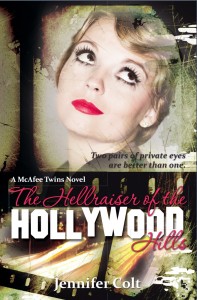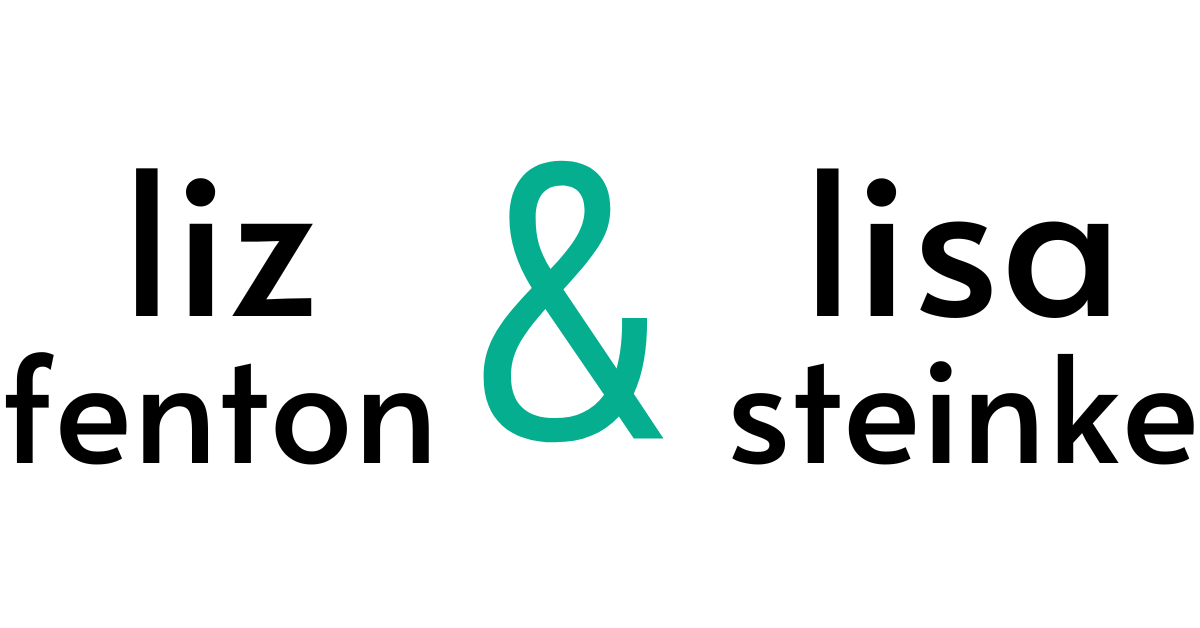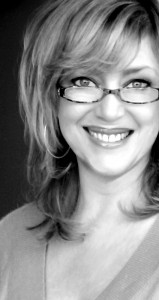 It's that time again... Writing Wednesday where we "talk shop". And today we wanted to let someone else do the yapping for us (sometimes we get tired of hearing ourselves blog!) Plus, we crave inside scoop about the biz as we shop our manuscript and anxiously await representation, praying we make more desktops than slushpiles (so far, so good although we did recently suffer one rejection that really bummed us out).
So today we decided to give Jennifer Colt, the author of The Hellraiser of the Hollywood Hills: A McAfee Twins Novel, the floor. She's been published by a major publishing house, she's tried self- publishing and she's been independently published (and not necessarily in that order). And now she's on to e-books. And we wanted to know if she could pick only one type of publishing, which would it be?
It's that time again... Writing Wednesday where we "talk shop". And today we wanted to let someone else do the yapping for us (sometimes we get tired of hearing ourselves blog!) Plus, we crave inside scoop about the biz as we shop our manuscript and anxiously await representation, praying we make more desktops than slushpiles (so far, so good although we did recently suffer one rejection that really bummed us out).
So today we decided to give Jennifer Colt, the author of The Hellraiser of the Hollywood Hills: A McAfee Twins Novel, the floor. She's been published by a major publishing house, she's tried self- publishing and she's been independently published (and not necessarily in that order). And now she's on to e-books. And we wanted to know if she could pick only one type of publishing, which would it be?
And Jennifer has graciously offered to give away FIVE signed copies of her latest novel, The Hellraiser of the Hollywood Hills! (We'll randomly select the winners this Friday!) It's a story that the Elizabeth Gilbert, the author of Eat Pray Love says she got a big kick out of and can't wait for the next. The premise? Terry and Kerry are identical twins and private eyes who run Double Indemnity Investigations where they keep tabs on philandering husbands, among other things. But before they know it, they find themselves the number one suspects in a kidnapping investigation. All while they act as glorified babysitters to the Hollywood megastar they're accused of stealing. JUICY!!
And now, here's Jennifer!
L&L: You've done it all- what are the pro's and cons of each type of publishing?
JC: This is a loaded question! It would take pages to answer fully, but here’s basically how it breaks down:
1) Major publisher: They have money and market clout, but they’ll probably spend neither on you if you’re a first-time author. You will need to do most of all the marketing and promotion on your book.
If you’re lucky enough to be picked up by a major publishing house, it means you’ve been championed by an individual editor and vetted by an acquisitions committee, and that the art, marketing, and publicity departments now have a stake in your success. Reviewers will be more likely to give your book a shot. Booksellers will not shun you the way they sometimes do self-publishers (they won’t roll out the red carpet, either – you’re still an unproven quantity).
But it’s important to understand that you will still do most of the shlepping, pitching, and self-promotion. Even established authors like Barry Eisler say they spend 20% of their time on writing, 80% on promotion.
If your sales are good, the publisher will take notice and likely spend/expend more effort on your behalf going forward. If you’ve started out as a paperback author, they may give you a promotion to hardcover!
2) Independent publishing: Most people should not do this the first time out. The print-on-demand business is now so sophisticated, the marketing and distribution so good, there’s no need to lay out the extra monies on physical books that you’ll have to inventory.
That said, if you want to do it I can help you. I’ve started a business now called writerrevolution.com. There are advantages to going this way, such as having your own ISBN and being treated as a real publisher, but you have to be very committed to it. It’s time-consuming and costly, and you should know exactly where your market is and how many books you can sell. (Again, that’s something I can help you identify.)
3) Self-publishing: This is the way to go for many people. It in no way prevents you from being picked up by a major. If you have a great book that is well presented, if reviewers have nice things to say about it, you are in virtually the same position as a first-time author who has a publishing contract, except that you haven’t received an advance. However, your individual royalties will be higher.
If your book or series is a success, you can be sure you’ll be considered by big publishers. You’ve done a lot of the legwork, and they can ride on what you’ve already accomplished in the way of introducing your work to the marketplace. I consider it to be like showcasing your independent film at the film markets. If it’s well received and there’s a defined market for it, a major distributor may pick it up.
In the case of apps like Kindle, you can price your book in such a way that people will be more likely take a chance on you as a new author. It’s a way to build a readership. By now I suppose everyone knows the story of JA Konrath, but in case you don’t…
Joe Konrath (aka Jack Killborn) is a real pioneer in this area. He had so many unpublished manuscripts lying around that, after first offering them for free on his website, he took advantage of the new Kindle technology to sell them at under $2.00 per download. He claims that his slasher book Serial was downloaded more than 70,000 times. With all of his Kindle offerings, he’s making much more money now than he did with the traditional publishers. Plus, Amazon is now playing the role of publisher, offering him an advance on his next book.
Full circle, anyone?
Times have changed and they continue to change, very fast. You can get whiplash trying to keep up.
Notwithstanding the foregoing…
DON’T LISTEN TO ME.
I mean it. I have to get a little woo-woo on you here and say that only you know what’s right for you to do. Consult your gut. Take it out to lunch; have a frank discussion with it. Maintain a “beginner’s mind” and forget the experts. They (we) can only tell you what our experience is and was. Who knows what’s in the cards for you? It’s all a learning experience.
L&L: How did you get an agent AFTER you self-published?
JC: I’ve done all of the above in terms of publishing. I started out in the dark ages of POD with iUniverse, using such bad covers it’s excruciating to see them still up on bookseller sites. (I didn’t yet understand that with the Internet, whatever you do will be there forever.) While writing the series, I queried agents. I didn’t get any interest from them, but I continually sent the finished books out to review sites.
I got some great notices, so I cribbed catchy phrases from them for a new query letter, which finally got me the attention of a terrific agent. (It’s important to target your queries to agents who work with your type of writing. Do the research and give them what they’re looking for only.)
Because I hadn’t expected to hear from her so soon, I had fibbed a little and said the third book, The Vampire of Venice Beach, was ready to go. She panicked a little when she learned that it needed more work, but I didn’t cave. I knew I had to finish it properly so I made her wait.
Then she took the books out to auction – what an exciting day! She called and emailed me several times during the day to update me on the bidding war. At the end of the day we took the offer from Broadway Books, which was the highest.
What bothered me was that they kept calling the series a “trilogy.” I was busy writing the fourth book at that time, and certainly wanted it to continue. I was afraid they’d make me wrap up all the storylines at the end of the third book but they didn’t. I guess they wanted to leave their options open.
In the end, the books didn’t earn out, meaning that they never went into profit. Instead of letting them die (I couldn’t let them snuff out my characters!) I published the next two books on my own.
I’ve really been missing my girls, the McAfee Twins. I keep getting mail from fans wondering where the next book is. I think I’ll write a sixth and do the CreateSpace/Kindle thing with them. The problem is finding the time!
L&L: What are you working on now?
JC: I have an abiding interest in all matters spiritual. That’s how I spend my spare time, reading and contemplating those things, so I’ve finally decided to write a book about them. I’ve dubbed it a “spiritual memoir” because it’s the story of how I’ve learned to integrate these ideas into my experience over the course of a lifetime. It’s almost finished. (I mean the manuscript, not the lifetime!)
Don’t be frightened by the subject matter – the book is a hoot. The tentative title is Minor Mercies & Big-Ass Miracles. I go into some detail about the techniques I’ve used in obtaining a book deal, etc., such as affirmative prayer, visualization, etc. I know everyone’s heard about that stuff ad nauseam, but I’ve kept a journal for thirteen years that tracks their effectiveness. For instance, I include a copy of the mock press release I wrote for myself before I even had an agent, alongside of the actual press release that came out nine months later. The real press release mirrors my fake one almost verbatim, including the advance amount.
I especially want to get this book out there because I think it could help people who are struggling. (And who isn’t these days?) I’d better go get to work on it now!
For more information about Jennifer Colt, head over to her website!

